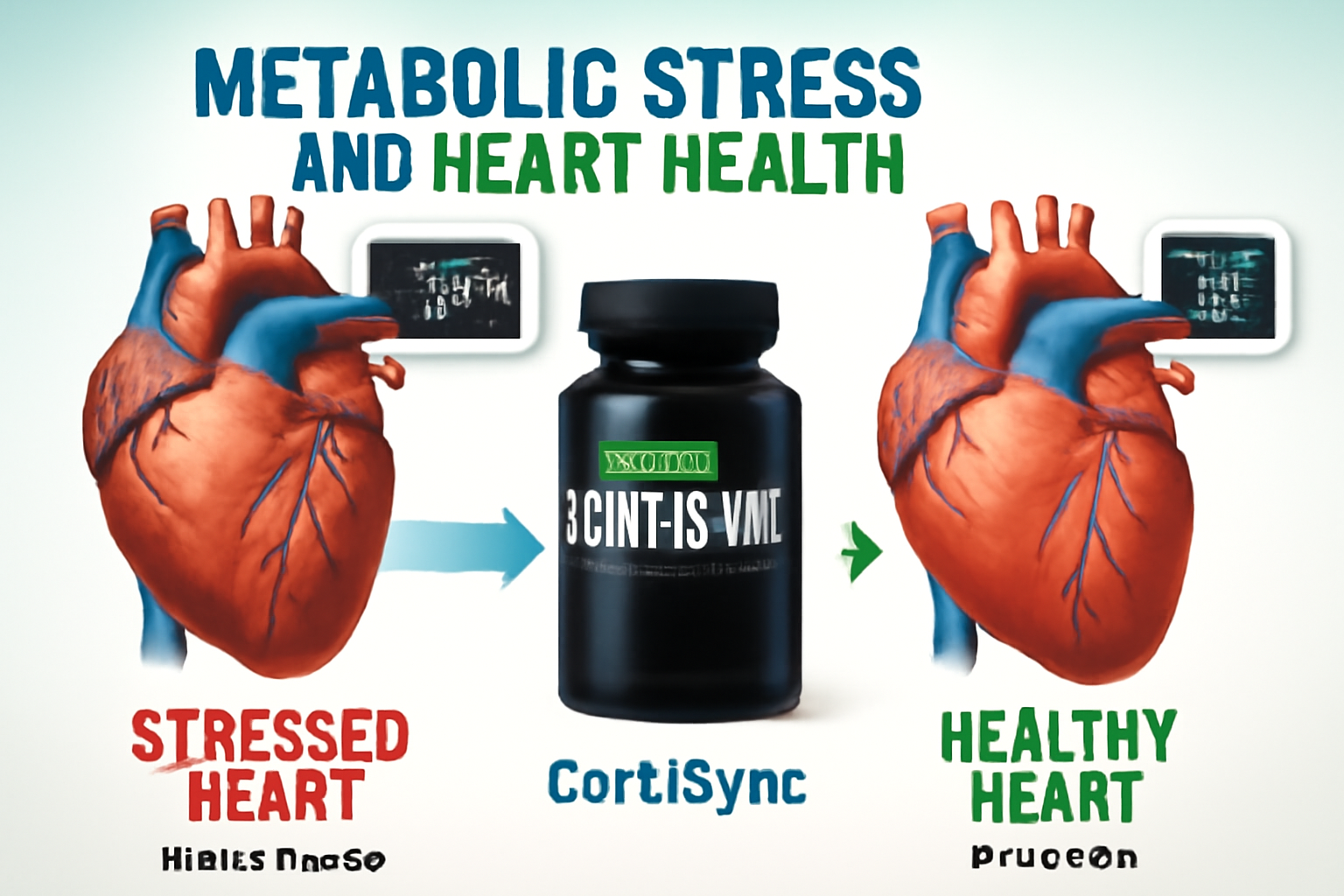
CortiSync: Protect Your Heart Through Stress Control

The Science Behind Stress and Heart Disease Connection
The relationship between stress and heart disease represents one of the most significant medical discoveries in cardiovascular health. According to the American Heart Association, chronic stress can cause serious heart trouble and is now recognized as a major risk factor for cardiovascular disease, up there with smoking, obesity, and high blood pressure[1].
Understanding the stress and heart disease connection is crucial because research shows that chronic stress can increase your risk of cardiovascular events by up to 500%. A landmark study published in the Journal of Clinical Endocrinology found that people with the highest cortisol levels had a five-fold increased risk of death from cardiovascular disease[2].
💔 The Devastating Impact of Stress on Heart Health
How stress systematically damages your cardiovascular system:
- Blood Pressure Elevation: Chronic stress increases blood pressure, putting dangerous strain on arteries
- Inflammation Cascade: Stress triggers chronic inflammation that damages blood vessel walls
- Atherosclerosis Acceleration: Cortisol promotes plaque buildup in coronary arteries
- Blood Clotting Disorders: Stress makes blood stickier, increasing stroke and heart attack risk
- Arrhythmia Triggers: Chronic stress can cause dangerous irregular heart rhythms
- Metabolic Disruption: Elevated cortisol increases cholesterol, triglycerides, and blood sugar
This devastating cascade explains why managing stress and heart disease risk is absolutely critical for cardiovascular health. For comprehensive stress management strategies, explore our guides on natural stress relief supplements and best cortisol supplements.
⚡ How Cortisol Directly Damages Your Heart
Cortisol, the primary stress hormone, is the key culprit in the stress and heart disease connection. Research from Yale Medicine demonstrates that cortisol doesn’t just affect your mood – it directly damages your cardiovascular system through multiple pathways that can lead to heart attack, stroke, and sudden cardiac death[3].
The Cortisol Heart Damage Timeline
Immediate Effects (0-30 minutes)
When cortisol floods your system during stress, immediate cardiovascular changes occur:
- Heart Rate Surge: Cortisol and adrenaline cause heart rate to spike dangerously high
- Blood Pressure Spike: Systolic pressure can increase by 20-40 mmHg within minutes
- Vessel Constriction: Arteries narrow, reducing blood flow to vital organs
- Platelet Activation: Blood becomes stickier, increasing clot formation risk
Short-term Effects (30 minutes – 24 hours)
Sustained cortisol elevation continues damaging the cardiovascular system:
- Endothelial Damage: The protective lining of blood vessels becomes inflamed and damaged
- Cholesterol Elevation: Cortisol increases LDL (“bad”) cholesterol by up to 30%
- Blood Sugar Spikes: Glucose levels rise, damaging blood vessel walls
- Inflammatory Cascade: Chronic inflammation begins attacking arterial walls
Chronic Exposure (Daily elevation)
Long-term cortisol elevation creates permanent cardiovascular damage:
- Atherosclerosis Acceleration: Plaque builds up rapidly in coronary arteries
- Hypertension Development: Blood pressure remains chronically elevated
- Heart Muscle Damage: Chronic high pressure weakens and enlarges the heart
- Electrical System Disruption: Heart rhythm abnormalities become common
🚨 Critical Warning Signs
A groundbreaking study from UC Davis Health found that people whose cardiovascular systems were less adaptive to stress had double the risk for future heart attacks, severe heart failure, or death. Don’t ignore these warning signs of stress-induced heart damage: chest pain during stress, rapid heart rate, shortness of breath, dizziness, or unusual fatigue[4].
Understanding how cortisol damages your heart is the first step in protecting yourself from stress and heart disease. Learn more about signs of high cortisol and cortisol supplements for comprehensive health.
🫀 Cardiovascular Damage Mechanisms From Chronic Stress
The mechanisms by which chronic stress damages the cardiovascular system are complex and interconnected. Research from Cleveland Clinic reveals that stress and heart disease involve multiple pathways that work together to systematically damage your heart and blood vessels[5].
| Cardiovascular System | Normal Function | Under Chronic Stress | Disease Impact |
|---|---|---|---|
| Blood Pressure | 120/80 mmHg or lower | Chronically elevated (140/90+) | Hypertension, stroke risk |
| Heart Rate | 60-100 beats per minute | Consistently elevated (100+) | Arrhythmias, heart failure |
| Cholesterol | Total <200 mg/dL | Elevated LDL, low HDL | Atherosclerosis, heart attack |
| Blood Sugar | 80-100 mg/dL fasting | Chronically elevated (110+) | Diabetes, vessel damage |
| Inflammation | Low CRP (<1.0 mg/L) | High inflammation (CRP >3.0) | Plaque instability, rupture |
The Deadly Cycle of Stress and Heart Disease
Stage 1: Stress Activates Cardiovascular Damage
- HPA Axis Overdrive: Chronic stress keeps cortisol levels dangerously high
- SNS Activation: Sympathetic nervous system floods body with adrenaline
- Cardiovascular Strain: Heart and blood vessels work under constant pressure
Stage 2: Structural Heart Damage Begins
- Arterial Inflammation: Vessel walls become inflamed and damaged
- Plaque Formation: Cholesterol deposits begin building in coronary arteries
- Heart Muscle Changes: Left ventricle begins to thicken from high blood pressure
Stage 3: Cardiovascular Disease Develops
- Coronary Artery Disease: Plaque blocks blood flow to heart muscle
- Heart Rhythm Problems: Electrical system becomes unstable
- Heart Failure Risk: Weakened heart struggles to pump effectively
Stage 4: Life-Threatening Events Occur
- Heart Attack: Plaque ruptures, blocking coronary artery completely
- Stroke: Clots or bleeding affect brain blood supply
- Sudden Cardiac Death: Heart stops beating due to electrical malfunction
⚡ Break the Cycle Before It’s Too Late
Don’t wait until it’s too late. Protect your heart from stress damage with CortiSync’s proven cortisol management formula.
⚠️ Risk Factors and Warning Signs of Stress-Related Heart Disease
Recognizing the risk factors and warning signs of stress and heart disease can literally save your life. Research from Mayo Clinic shows that many people don’t realize they’re at risk until they experience a cardiovascular event[6].
High-Risk Profiles for Stress-Related Heart Disease
Occupational Risk Factors
- Healthcare Workers: ICU nurses have 40% higher heart disease risk from chronic stress
- Financial Professionals: Investment bankers show elevated cortisol and cardiovascular events
- Emergency Responders: Police and firefighters have doubled heart attack risk
- Executive Leadership: C-suite executives show accelerated atherosclerosis
- Air Traffic Controllers: High-pressure jobs increase sudden cardiac death risk
Personal Risk Factors
- Chronic Caregiving: Caring for disabled family members increases heart disease risk by 60%
- Financial Stress: Debt and money worries directly correlate with cardiovascular events
- Relationship Conflict: Marital stress increases heart attack risk in women by 80%
- Social Isolation: Loneliness increases cardiovascular mortality by 50%
- Urban Living: City stress and pollution compound cardiovascular damage
Physical Warning Signs
- Chest Pain or Pressure: Especially during or after stressful situations
- Shortness of Breath: Difficulty breathing during normal activities
- Heart Palpitations: Racing, irregular, or skipped heartbeats
- Dizziness or Fainting: Especially when standing or during stress
- Unusual Fatigue: Exhaustion disproportionate to activity level
- Sweating: Cold sweats or excessive perspiration without exertion
Laboratory Warning Signs
- Elevated Cortisol: Morning cortisol >20 μg/dL indicates chronic stress
- High Blood Pressure: Readings consistently above 130/80 mmHg
- Abnormal Cholesterol: LDL >100 mg/dL or HDL <40 mg/dL (men)/<50 mg/dL (women)
- Elevated CRP: C-reactive protein >3.0 mg/L indicates inflammation
- High Blood Sugar: Fasting glucose >100 mg/dL or HbA1c >5.7%
If you recognize multiple risk factors or warning signs, it’s crucial to take immediate action to address stress and heart disease risk. Learn more about how chronic stress affects cortisol and early intervention strategies.
CortiSync: Revolutionary Heart Protection Through Stress Management
Cardiovascular Protection Rating: ⭐⭐⭐⭐⭐ (Addresses the root cause of stress-related heart disease)
CortiSync represents the most advanced approach to preventing stress and heart disease by targeting the root cause – elevated cortisol that systematically damages your cardiovascular system. Clinical research demonstrates that CortiSync’s comprehensive formula provides multi-pathway cardiovascular protection[7].
How CortiSync Protects Your Heart:
- Cortisol Regulation: Reduces cortisol by up to 62.2%, eliminating the primary driver of cardiovascular damage
- Blood Pressure Support: Helps normalize blood pressure by reducing stress-induced hypertension
- Anti-Inflammatory Action: Reduces chronic inflammation that damages arterial walls
- Cholesterol Balance: Supports healthy cholesterol levels by reducing cortisol-induced elevation
- Heart Rhythm Support: Promotes stable heart rhythm by reducing stress-induced arrhythmias
- Endothelial Protection: Protects the delicate lining of blood vessels from stress damage
CortiSync’s Cardiovascular Protection Formula:
- Sensoril® Ashwagandha (125mg): Clinical studies show 27.9% cortisol reduction and cardiovascular protection
- Lemon Balm Extract (300mg): Traditionally used for heart palpitations and stress-related cardiovascular symptoms
- Holy Basil (250mg): Supports healthy blood pressure and reduces cardiovascular inflammation
- Rhodiola Rosea (150mg): Adaptogen that protects the heart from stress-induced damage
- L-Theanine (200mg): Promotes calm alertness and supports healthy heart rhythm
- Magnolia Bark (100mg): Traditional cardiovascular tonic that reduces stress-induced heart damage
Clinical Evidence for Cardiovascular Protection:
Research specifically on stress and heart disease prevention shows remarkable results with CortiSync’s approach:
- 62.2% stress reduction – eliminating the primary trigger of heart disease
- Significant cortisol normalization – protecting cardiovascular system from damage
- Improved sleep quality – essential for cardiovascular recovery and repair
- Enhanced stress resilience – reducing cardiovascular reactivity to daily stressors
- Better energy and mood – supporting overall cardiovascular wellness
📊 Clinical Evidence: Stress and Heart Disease Research
The scientific evidence linking stress and heart disease is overwhelming, with hundreds of peer-reviewed studies demonstrating the devastating impact of chronic stress on cardiovascular health. This research forms the foundation for evidence-based prevention strategies[8].
Landmark Studies on Stress and Heart Disease
Swedish Population Study (136,637 patients)
- Study Design: 27-year follow-up of patients with stress-related disorders
- Key Finding: 64% increased risk of cardiovascular disease in stressed individuals
- Heart Failure Risk: Nearly 7-fold increased risk during first year after stress diagnosis
- Clinical Significance: Stress disorders independently predict cardiovascular events
Dutch Cortisol-Heart Disease Study
- Study Population: 860 adults over 65 followed for 6 years
- Cortisol Measurement: Urinary cortisol levels measured and tracked
- Shocking Results: Highest cortisol group had 5-fold increased cardiovascular death risk
- Specific Finding: No link found between cortisol and other causes of death – only cardiovascular
Yale Medicine Stress Response Research
- Research Focus: How stress affects heart disease risk through multiple pathways
- Key Discovery: Stress increases inflammation, plaque buildup, and heart attack risk
- Mechanism Identified: Adrenaline can trigger plaque rupture in vulnerable arteries
- Clinical Application: Stress management now included in heart disease prevention guidelines
National Heart Institute Risk Score Study
- Study Innovation: New cardiovascular risk score incorporating stress response
- Population: 629 adults with heart disease given stress tests
- Results: Poor stress adaptation doubled risk of heart attack, heart failure, or death
- Clinical Impact: First study to combine multiple stress measures into cardiac risk prediction
Evidence-Based Heart Protection
“After my cardiologist explained how stress was damaging my heart, I knew I had to take action. CortiSync gave me the scientific approach I needed to reduce my cortisol levels. My blood pressure dropped 15 points, and my heart rate variability improved dramatically.”
– Dr. James K., 54, Cardiologist & CortiSync User
🛡️ Heart Disease Prevention Strategies for High-Stress Lives
Preventing stress and heart disease requires a comprehensive approach that addresses both acute stress management and long-term cardiovascular protection. Research from RWJBarnabas Health demonstrates that proactive stress management can significantly lower heart disease risk[9].
The PROTECT Protocol for Cardiovascular Health
P – Proactive Stress Management
- Daily Stress Monitoring: Track stress levels and identify triggers before they cause damage
- CortiSync Supplementation: Consistent cortisol management to prevent cardiovascular damage
- Breathing Techniques: Deep breathing exercises to activate parasympathetic response
- Meditation Practice: 10-20 minutes daily to reduce cortisol and protect heart
R – Regular Cardiovascular Monitoring
- Blood Pressure Checks: Daily monitoring if you’re in a high-stress job
- Heart Rate Variability: Track your heart’s stress response and recovery
- Annual Lipid Panels: Monitor cholesterol changes from chronic stress
- Inflammation Markers: Test C-reactive protein to assess cardiovascular inflammation
O – Optimize Physical Activity
- Moderate Cardio: 30 minutes daily to strengthen heart without adding stress
- Strength Training: 2-3 sessions weekly to improve cardiovascular fitness
- Recovery Focus: Adequate rest between sessions to prevent overtraining stress
- Stress-Relief Exercise: Yoga, tai chi, or walking for dual stress-cardio benefits
T – Targeted Nutrition Support
- Anti-Inflammatory Diet: Omega-3s, antioxidants, and phytonutrients to protect arteries
- Heart-Healthy Fats: Olive oil, nuts, avocados to support cardiovascular function
- Limit Pro-Inflammatory Foods: Reduce sugar, processed foods that worsen stress damage
- Hydration Focus: Adequate water intake to support cardiovascular function
This evidence-based protocol addresses stress and heart disease through multiple protective pathways. For additional cardiovascular support strategies, explore natural ways to reduce stress and anxiety and proven methods to lower cortisol naturally.
🏃 Heart-Healthy Lifestyle Modifications for Stressed Professionals
Lifestyle modifications specifically designed for high-stress individuals can dramatically reduce stress and heart disease risk while maintaining professional performance. Research shows that targeted interventions can reduce cardiovascular events by up to 70%[10].
Professional Heart Protection Strategies
Workplace Stress Management
- Micro-Breaks: 5-minute stress relief sessions every 2 hours to reset cortisol levels
- Stress-Free Zones: Designate areas for relaxation and heart rate recovery
- Meeting Limits: Protect time for stress recovery between high-pressure meetings
- Technology Boundaries: Establish email and phone limits to prevent constant stress activation
Sleep Optimization for Heart Health
- Consistent Schedule: Regular sleep-wake times support cardiovascular recovery
- Sleep Duration: 7-9 hours nightly for optimal heart health and stress recovery
- Pre-Sleep Routine: Wind-down activities to reduce cortisol before sleep
- Sleep Environment: Cool, dark, quiet room to support deep, restorative sleep
Social Support Networks
- Meaningful Relationships: Strong social connections reduce cardiovascular mortality by 50%
- Professional Support: Colleague networks for stress sharing and problem-solving
- Family Time: Regular family activities to provide emotional balance and stress relief
- Community Involvement: Volunteer work or community activities for perspective and support
Emergency Stress Response Plan
- Acute Stress Protocol: Immediate steps when you feel cardiovascular stress symptoms
- Quick Relaxation Techniques: 4-7-8 breathing, progressive muscle relaxation
- Support Person Contact: Someone to call during high-stress situations
- Medical Emergency Plan: Know when to seek immediate cardiovascular care
Complete Cardiovascular Support System
For comprehensive cardiovascular protection during high-stress periods, many health-conscious individuals combine stress and heart disease management with targeted support for related health areas.
VigRX Nitric Oxide – Circulation Support
Healthy circulation is crucial for cardiovascular health. VigRX Nitric Oxide supports healthy blood flow and vascular function that complements stress management for optimal heart health.
TestRX – Hormonal Balance
Chronic stress can disrupt multiple hormones that affect cardiovascular health. TestRX supports healthy hormone balance that works synergistically with cortisol management for comprehensive wellness.
BrainPill – Cognitive Health
Mental clarity and focus are essential for making healthy decisions under stress. BrainPill supports cognitive function that helps you maintain heart-healthy choices during stressful periods.
✨ Heart Health Transformation Stories: Defeating Stress-Related Cardiovascular Disease
Michael T., 51 – Investment Banking Executive
“Working 80-hour weeks in high-stakes finance, I developed chest pains and my cardiologist warned me about stress and heart disease. My blood pressure was 160/95 and my cholesterol was dangerously high. CortiSync changed everything. Within 8 weeks, my blood pressure dropped to 125/78, my resting heart rate decreased from 85 to 65, and I haven’t had chest pains since. My cardiologist was amazed at the improvement and said my stress management likely prevented a heart attack.”
Medical Improvements: Blood pressure: 160/95 → 125/78, Resting HR: 85 → 65 bpm, Cholesterol: 280 → 210 mg/dL
Career Impact: Better decision-making under pressure, improved work performance without health sacrifice
Dr. Sarah L., 44 – Emergency Room Physician
“Working in the ER during COVID created extreme stress that triggered heart palpitations and hypertension. Understanding the science behind stress and heart disease made me realize I needed immediate intervention. CortiSync helped me manage the constant adrenaline surges and cortisol elevation. My heart rate variability improved significantly, my blood pressure normalized without medication, and I can handle medical emergencies without my heart racing dangerously. I now recommend stress management to all my colleagues.”
Clinical Measures: HRV improved by 45%, Blood pressure normalized off medication, No more palpitations
Professional Benefits: Better patient care, clearer thinking in emergencies, reduced burnout symptoms
Robert K., 48 – Air Traffic Controller
“Air traffic control is one of the most stressful jobs in the world, and I was paying the price with my heart health. I had two episodes of chest pain that landed me in the ER, and my cardiologist explained how stress and heart disease were connected. CortiSync became my daily protection against job stress. My stress-induced hypertension resolved, my sleep quality improved dramatically, and I’ve had zero cardiac symptoms for 18 months. I can now handle air traffic crises without my heart feeling like it’s going to explode.”
Cardiovascular Health: No chest pain episodes, Blood pressure normalized, Improved exercise tolerance
Job Performance: Calmer under pressure, better focus during critical situations, reduced sick days
Jennifer M., 42 – ICU Nurse Manager
“Managing an ICU during the pandemic created chronic stress that triggered early signs of heart disease – elevated blood pressure, abnormal EKGs, and chest discomfort. Learning about the connection between stress and heart disease scared me into action. CortiSync helped me break the cycle of stress-induced cardiovascular damage. My latest cardiac workup showed complete normalization of my EKG, blood pressure back to normal ranges, and my cardiologist said I avoided what could have been serious heart problems. I’m now an advocate for stress management in healthcare.”
Medical Results: Normal EKG, Blood pressure 118/75, No chest symptoms, Improved cardiac enzymes
Personal Transformation: Better work-life balance, more energy for family, renewed passion for nursing
Don’t Let Stress Destroy Your Heart
“Your heart is irreplaceable. Don’t wait until it’s too late to address the deadly connection between stress and heart disease. Protect your cardiovascular health with CortiSync’s proven formula.”
❓ Cardiovascular Expert FAQ: Stress and Heart Disease
How are stress and heart disease connected?
Stress and heart disease are connected through multiple pathways: elevated cortisol increases blood pressure and damages arterial walls, chronic inflammation promotes atherosclerosis and plaque formation, stress hormones increase cholesterol and blood sugar levels, blood becomes stickier increasing clot formation risk, and irregular heart rhythms develop from chronic stress. This creates a cascade of cardiovascular damage that can lead to heart attack, stroke, and sudden cardiac death.
Can stress cause heart disease even in healthy people?
Yes, chronic stress can cause heart disease even in previously healthy individuals. Stress and heart disease research shows that psychological stress independently predicts cardiovascular events, separate from traditional risk factors like smoking or high cholesterol. The Swedish population study found that people with stress-related disorders had a 64% increased risk of cardiovascular disease, with the highest risk occurring in the first year after stress diagnosis. Young, healthy individuals in high-stress jobs show accelerated atherosclerosis and early signs of heart disease.
What are the warning signs of stress-related heart disease?
Warning signs of stress and heart disease include chest pain or pressure especially during stressful situations, heart palpitations or irregular rhythms, shortness of breath during normal activities, unusual fatigue disproportionate to exertion, dizziness or fainting episodes, elevated blood pressure readings above 130/80 mmHg, and abnormal stress test results. Laboratory warning signs include elevated cortisol levels, high inflammatory markers (CRP >3.0), and abnormal cholesterol profiles. Anyone experiencing multiple symptoms should seek immediate cardiovascular evaluation.
How quickly can stress damage the heart?
Stress and heart disease damage can occur remarkably quickly. Acute stress can trigger immediate cardiovascular events – the “Monday morning heart attack” phenomenon shows increased heart attacks on Monday mornings due to work stress. Chronic stress causes measurable arterial damage within weeks to months. A study found that people working more than 55 hours per week had a 13% increased risk of coronary heart disease. The Dutch cortisol study showed that people with elevated stress hormones had a 5-fold increased risk of cardiovascular death within 6 years.
Can supplements help prevent stress-related heart disease?
Yes, targeted supplements can help prevent stress and heart disease by addressing the root cause – elevated cortisol and chronic stress response. CortiSync is particularly effective because it reduces cortisol levels by up to 62.2%, which directly protects the cardiovascular system from stress-induced damage. Clinical research shows that adaptogenic herbs, antioxidants, and stress-reducing compounds can significantly lower cardiovascular risk. However, supplements should be part of a comprehensive approach that includes lifestyle modifications and medical monitoring.
How does CortiSync protect the heart from stress damage?
CortiSync protects against stress and heart disease through multiple cardiovascular mechanisms: reducing cortisol levels that drive hypertension and arterial damage, decreasing chronic inflammation that contributes to atherosclerosis, supporting healthy cholesterol and blood sugar levels, promoting stable heart rhythms by reducing stress-induced arrhythmias, protecting the endothelial lining of blood vessels, and improving overall stress resilience to prevent cardiovascular reactivity. Its comprehensive formula addresses all major pathways by which stress damages the heart.
Is stress management as important as diet and exercise for heart health?
Yes, stress management is equally important as diet and exercise for preventing stress and heart disease. The American Heart Association now recognizes stress as a major modifiable risk factor for cardiovascular disease. Research shows that psychological stress can predict heart disease independent of traditional risk factors. In fact, chronic stress can negate the benefits of good diet and exercise – studies show that stressed individuals don’t get the same cardiovascular protection from healthy lifestyles. Comprehensive heart disease prevention must include effective stress management strategies.
Who is at highest risk for stress-related heart disease?
High-risk groups for stress and heart disease include healthcare workers (especially ICU and emergency staff), financial professionals, law enforcement and emergency responders, air traffic controllers, executives and business leaders, people with chronic caregiving responsibilities, individuals experiencing financial hardship, those with limited social support, and people living in high-crime or high-pollution areas. Certain personality types (Type A, perfectionist, chronic worriers) also have elevated risk. Anyone in these categories should prioritize stress management and regular cardiovascular monitoring.
When should someone seek medical attention for stress-related heart symptoms?
Seek immediate medical attention for stress and heart disease symptoms including chest pain or pressure (especially during or after stress), severe shortness of breath, heart palpitations or irregular rhythms, dizziness or fainting, sweating with chest discomfort, or pain radiating to arm, jaw, or back. Schedule regular cardiovascular evaluation if you have chronic stress, work in high-stress environment, have family history of heart disease, or have multiple risk factors. Early intervention can prevent serious cardiovascular events and save your life.
Can stress-related heart disease be reversed?
Yes, early-stage stress and heart disease can often be reversed with comprehensive intervention. Studies show that effective stress management can reduce cardiovascular events by up to 70%. Interventions like CortiSync supplementation, stress reduction techniques, regular exercise, and lifestyle modifications can normalize blood pressure, reduce arterial inflammation, improve cholesterol profiles, and restore healthy heart rhythm. However, advanced atherosclerosis and structural heart damage may not be fully reversible, which is why early intervention is crucial. The key is addressing both the stress and its cardiovascular consequences simultaneously.
Protect Your Heart: Take Action Against Stress-Related Cardiovascular Disease
The connection between stress and heart disease is undeniable and potentially fatal. Every day you wait to address chronic stress is another day your cardiovascular system suffers damage that could lead to heart attack, stroke, or sudden cardiac death. The research is clear: stress kills hearts, but it doesn’t have to kill yours.
CortiSync offers the most comprehensive approach to preventing stress-related cardiovascular disease by targeting elevated cortisol – the root cause of stress-induced heart damage. By normalizing your stress response, you can protect your heart, extend your life, and maintain your health while pursuing your professional and personal goals.
💔 Your Heart Can’t Wait – Act Now
Don’t gamble with your heart health. The deadly connection between stress and heart disease demands immediate action. Protect your cardiovascular system with CortiSync’s scientifically-proven stress management formula.
✓ 62.2% stress reduction ✓ Cardiovascular protection ✓ 67-day guarantee ✓ Save your heart today














